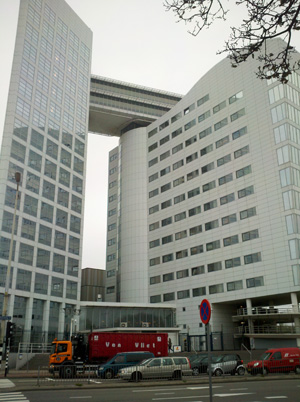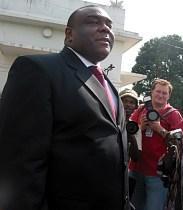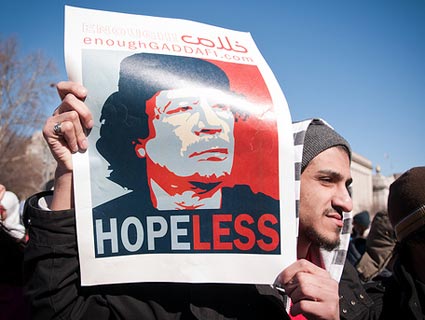
The ICC's headquarters in The Hague.Photo: Mac McClelland
As mentioned earlier, this week I’m in The Hague, doing some reporting at the International Criminal Court. Since a lot of people seem to have only the vaguest sense of what it is, and because I’ve learned some interesting facts since I got here, I put together a quick primer that answers a few of your burning ICC-related questions.
What is the International Criminal Court?
It’s the world’s first permanent court set up to prosecute war crimes, crimes against humanity, and genocide. It was established in 2002, when its founding Rome Statute Treaty, which 114 states are party to, went into effect. It is located in The Hague, the Netherlands. It is not housed in a big fabulous structure with marble floors, but in an old corporate office building, the former parking garage of which holds the actual courtrooms.
How does something end up at trial in the ICC?
One of three ways. A case can be referred to the ICC by a member state. Or crimes in a non-member state can be referred to the court by the United Nations Security Council, as in the recent case of Libya. Or anyone can give the Office of the Prosecutor information that gives cause to look into it. If a resulting investigation shows war crimes, crimes against humanity, or genocide, and the state in which they occur is unwilling or unable to prosecute the case itself, the “court of last resort” ICC can issue warrants of arrest or summons to appear.
In what countries is the ICC currently investigating crimes?
Despite criticisms that the ICC only tries Africans, which is so far/currently true, it is looking into cases in Afghanistan, Colombia, Cote d’Ivoire, Georgia, Palestine, Guinea, Honduras, Nigeria, and South Korea.
Are there any trials going on now?
Yeah, against Congolese alleged war-crimes perpetrators Thomas Lubanga Dyilo and Jean-Pierre Bemba Gombo. Except on days where testimony is too sensitive, as when a witness could be in particular danger of retribution, the trials are open to the public.
 Jean-Pierre Bemba Gombo in 2006. Nico Colombant/VOA news/Wikimedia
Jean-Pierre Bemba Gombo in 2006. Nico Colombant/VOA news/Wikimedia
Am I allowed to wear “provocative” clothing to go watch a war-crimes trial?
No.
What happens if I pull my cell phone out when I’m in the observation gallery while court is in session?
Any testimony that a witness is giving is considered compromised and automatically canceled, and that witness is not allowed to testify anymore.
Am I allowed to mean-mug Jean-Pierre Bemba, on trial for multiple counts of crimes against humanity and war crimes of rape, murder, and pillaging, from a few feet away in the observation gallery, while he sits watching the proceedings against him with his cantaloupe head calmly sunk into hunched shoulders?
Yes. Although he will, however many times his eyes flicker over toward your face, never meet your gaze.
















